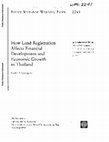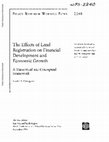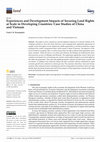Papers by Frank Byamugisha

Journal of Benefit-Cost Analysis
Government is the custodian of the most critical (and limited) factor of production, namely, land... more Government is the custodian of the most critical (and limited) factor of production, namely, land. Assuring the security of tenure, arbitrating disputes, and facilitating the transfer or sales of titles renders the land market more efficient and less volatile, attracting investors and promoting sustainable urban development. Land tenure security is also a critical government service that has repercussions on agricultural productivity, housing development, business investment, and the development of urban areas. However, land administration is mired in corruptive practices, elite capture, and inefficient allocation. Globally, only 24% of rural areas are mapped (46 in urban areas), with approximately the same percentage registered, that is, 22%. In Africa, only about 14% of rural land is formally recorded in a public register. Land tenure security can take a variety of forms depending on national regulatory frameworks that allocate land and specify its use. Success stories include tra...

printed on recycled paper 1 2 3 4 5 07 06 05 World Bank Working Papers are published to communica... more printed on recycled paper 1 2 3 4 5 07 06 05 World Bank Working Papers are published to communicate the results of the Bank's work to the development community with the least possible delay. The manuscript of this paper therefore has not been prepared in accordance with the procedures appropriate to formally-edited texts. Some sources cited in this paper may be informal documents that are not read-ily available. The findings, interpretations, and conclusions expressed herein are those of the author(s) and do not necessarily reflect the views of the International Bank for Reconstruc-tion and Development/The World Bank and its affiliated organizations, or those of the Exec-utive Directors of The World Bank or the governments they represent. The World Bank does not guarantee the accuracy of the data included in this work. The boundaries, colors, denominations, and other information shown on any map in this work do not imply any judgment on the part of The World Bank of the legal s...
Chemical Engineering Journal, 2016

This research investigates the role of land titling and registration in economic development with... more This research investigates the role of land titling and registration in economic development with the aim of adding knowledge by: (i) extending economic analysis from a sector to a macro level and across many countries; (ii) establishing the feasibility of applying a cost-benefit analysis to public investment in land registration; and (iii) deepening understanding of government regulations that restrict land transactions and, consequently, limit potential economic benefits of land registration. It addresses three questions: (i) whether land registration affects financial development; (ii) whether land registration affects economic growth; and (iii) whether public investment in land registration generates an economic rate of return higher than the opportunity cost of capital. The first two questions are addressed inconclusively with cross sectional regression techniques, due to econometric problems. The third question is addressed, with positive findings, using a case study of the Th...
Of course I cannot forget the academic staff of the Development Studies Centre. They have helped ... more Of course I cannot forget the academic staff of the Development Studies Centre. They have helped to keep my morale throughout. I am also grateful to Tony Vale of the Australian Department of Foreign Affairs for his immediate delivery of the report by the Commonwealth team of / experts on the rehabilitation of the Ugandan economy after the fall of Amin's government.

Policy Research Working Papers, 1999
Using an economywide conceptual framework, Economic growth responds to land titling following Bya... more Using an economywide conceptual framework, Economic growth responds to land titling following Byamugisha analyzes how land registration affects a J curve, by first registering a fall and recovering financial development and economic growth in Thailand. gradually, thereafter to post a long, strong rally. He uses contemporary techniques, such as error * The quality of land registration services, as correction and cointegration, to deal with such problems measured by public spending on land registration, has as time-series data not being stationary. He also uses the strongly positive and significant long-run effects on autoregressive distributed lag model to analyze long lags economic growth. in output response to changes in land registration. His key findings: * Land titling has significant positive long-run effects on financial development. This papera product of the Rural Development and Natural Resources Sector Unit, East Asia and Pacific Regionis part of a larger effort in the region to increase the effectiveness of country assistance strategies in the area of property rights and economic development. Copies of the paper are available free from the World Bank,
A Program to Scale Up Reforms and Investments, 2013
A Program to Scale Up Reforms and Investments, 2013
A Program to Scale Up Reforms and Investments, 2013

Policy Research Working Papers, 1999
Byamugisha develops a theoretical framework to guide registration and financial development and e... more Byamugisha develops a theoretical framework to guide registration and financial development and economic empirical analysis of how land registration affects growth, the framework links: financial development and economic growth. * Land tenure security and investment incentives. Most conceptual approaches investigate the effects of * Land title, collateral, and credit. land registration on only one sector, but land registration * Land markets, transactions, and efficiency. is commonly observed to affect not only other sectors * Labor mobility and efficiency. but the economy as a whole. * Land liquidity, deposit mobilization, and Byamugisha builds on the well-tested link between investment. secure land ownership and farm productivity, adding to Empirical results from applying the framework to a the framework theory about positive information and single case studyof Thailand, described in a separate transaction costs. To map the relationship between land papersuggest that the framework is sound. This papera product of the Rural Development and Natural Resources Sector Unit, East Asia and Pacific Regionis part of a larger effort in the region to increase the effectiveness of country assistance strategies in the area of property rights and economic development. Copies of the paper are available free from the World Bank,

World Bank Working Papers, 2005
Land reform can broadly be divided up into land tenure reform-the establishment of secure and for... more Land reform can broadly be divided up into land tenure reform-the establishment of secure and formalized property rights in land-and land redistribution-the transfer ofland from large to small farmers. The paper is therefore divided into two chapters. The first chapter gives a short narrative of some of the key land tenure and land policy issues. While these issues remain politically sensitive, there is a solid consensus emerging on how to deal with them, but only once the confusion surrounding private and common property, and formal and informal rights, is cleared up. In particular, secure property rights should notbe confused with full private "àwnership." Under certain economic conditions, property rights tend to become more individualized and formalized. However, the introduction of private title in situations where such economic conditions do not exist can be a waste of effort.

Agricultural Land Redistribution and Land Administration in Sub-Saharan Africa: Case Studies of Recent Reforms, 2014
Some rights reserved 1 2 3 4 17 16 15 14 This work is a product of the staff of The World Bank wi... more Some rights reserved 1 2 3 4 17 16 15 14 This work is a product of the staff of The World Bank with external contributions. The findings, interpretations, and conclusions expressed in this work do not necessarily reflect the views of The World Bank, its Board of Executive Directors, or the governments they represent. The World Bank does not guarantee the accuracy of the data included in this work. The boundaries, colors, denominations, and other information shown on any map in this work do not imply any judgment on the part of The World Bank concerning the legal status of any territory or the endorsement or acceptance of such boundaries. Nothing herein shall constitute or be considered to be a limitation upon or waiver of the privileges and immunities of The World Bank, all of which are specifically reserved.

Th is work is a product of the staff of Th e World Bank with external contributions. Note that Th... more Th is work is a product of the staff of Th e World Bank with external contributions. Note that Th e World Bank and the Agence Française de Développement do not necessarily own each component of the content included in the work. Th e World Bank and the Agence Française de Développement therefore do not warrant that the use of the content contained in the work will not infringe on the rights of third parties. Th e risk of claims resulting from such infringement rests solely with you. Th e fi ndings, interpretations, and conclusions expressed in this work do not necessarily refl ect the views of Th e World Bank, its Board of Executive Directors, or the governments they represent, or the Agence Française de Développement. Th e World Bank does not guarantee the accuracy of the data included in this work. Th e boundaries, colors, denominations, and other information shown on any map in this work do not imply any judgment on the part of Th e World Bank concerning the legal status of any te...

This work is a product of the staff of The World Bank with external contributions. Note that The ... more This work is a product of the staff of The World Bank with external contributions. Note that The World Bank and the Agence Française de Développement do not necessarily own each component of the content included in the work. The World Bank and the Agence Française de Développement therefore do not warrant that the use of the content contained in the work will not infringe on the rights of third parties. The risk of claims resulting from such infringement rests solely with you. The findings, interpretations, and conclusions expressed in this work do not necessarily reflect the views of The World Bank, its Board of Executive Directors, or the governments they represent, or the Agence Française de Développement. The World Bank does not guarantee the accuracy of the data included in this work. The boundaries, colors, denominations, and other information shown on any map in this work do not imply any judgment on the part of The World Bank concerning the legal status of any territory or t...

This paper develops a theoretical and conceptual framework to guide the empirical analysis of the... more This paper develops a theoretical and conceptual framework to guide the empirical analysis of the effects of land registration on financial development and economic growth. Such a framework is necessary to improve upon current and past investigation approaches which have focused on one sector, contrary to common observations to the effect that land registration affects not just one sector but many sectors and the economy as a whole. It builds upon the well-tested conceptual framework that links landownership security to farm productivity, and is underpinned by the theory of positive information and transaction costs. It is constructed with five linkages, to map the relationship between land registration and financial development and economic growth, namely: (i) the land tenure security and investment incentives linkage; (ii) the land title, collateral and credit linkage; (iii) the land markets, transactions and efficiency linkage; (iv) the labor mobility and efficiency linkage; and ...

Land
This paper reviews experiences and development impacts of a selected number of developing countri... more This paper reviews experiences and development impacts of a selected number of developing countries in Asia and Africa that have used emerging land registration approaches to rapidly secure land rights at scale. Rapid and scalable registration is essential to eliminate a major backlog of the world’s unregistered land, which stands at about 70 percent. The objective of the review, based on secondary data, is to draw lessons that can help accelerate land registration across many countries. While the focus is on China and Vietnam, the findings are buttressed by those from previous reviews in Ethiopia and Rwanda. The registration approaches used in these four countries were found to be cost-reducing, fast, inclusive and scalable enough to secure land rights for all within one generation. They also had significant positive impacts on land tenure security and investment. In addition, they indirectly along with other economic reforms contributed to rapid economic growth and a reduction in ...
Agricultural Land Redistribution and Land Administration in Sub-Saharan Africa:Case Studies of Recent Reforms, 2014
Agricultural Land Redistribution and Land Administration in Sub-Saharan Africa:Case Studies of Recent Reforms, 2014

Uploads
Papers by Frank Byamugisha